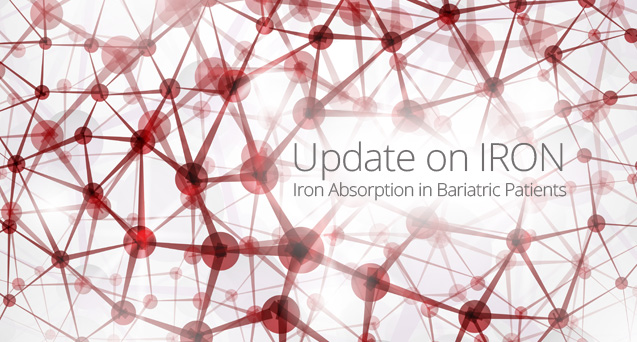Update on Iron
Iron deficiency is extremely common. In the preoperative bariatric patient population, the incidence of anemia has been reported to be approximately 21% and Iron deficiency at 20%. These numbers are likely to be higher in the postoperative bariatric patient population. The risk of anemia is increased for female patients, and individuals who have had more rapid and significant weight loss.
Iron Absorption in Bariatric Patients:
Iron is mostly absorbed in the Duodenum. It makes sense that gastric bypass patients have decreased absorption because this part of the intestine is bypassed from the food we eat.
There are many different forms of iron. Heme iron is iron bound to a protein that increases aborption. The richest sources of heme iron in the diet include lean meat and seafood. Dietary sources of nonheme iron include nuts, beans, vegetables, and fortified grain products. Nonheme iron can be referred to as elemental.
Elemental Iron is absorbed in the ferrous 2+ form. Most supplements are in the ferric 3+ form. Acid reduces the ferric iron to the absorbable ferrous form. Sleeve gastrectomy patients and gastric bypass patients have decreased acid production due to the stomach surgery, thereby decreasing normal absorption
The recommended dietary allowance for Iron intake in adults is 8 mg/day. However, bariatric surgery patients have an adjusted recommendation of 18-27 mg/day. This has been adopted by the bariatric community, but commonly we are seeing recommendations of 30-45 mg/day.
Ferrous and Ferric forms of Iron can cause nausea and constipation in high doses. Other forms of Iron such as Heme and Carbonyl have fewer side effects. If you are experiencing these side effects, try taking a different form of Iron.
The issue of Calcium and Iron in the same supplement is a debated topic.
Calcium can interfere with the absorption of iron, although this effect has not been definitively established in postoperative bariatric patients. For this reason, some experts suggest that people take individual calcium and iron supplements at different times of the day. However, there are no studies that demonstrate an increased deficiency of either Calcium or Iron in bariatric patients who take their multivitamin supplements all together. It is reasonable to recommend to a patient that has low Iron levels to separate their Calcium supplements. This should be framed in the understanding that the most important aspect with multivitamins is that the bariatric patient is at least taking some sort of supplement on a regular basis.
For bariatric patients who may become pregnant:
The Centers for Disease Control and Prevention (CDC) recommends that all pregnant women, at their first prenatal visit, begin taking an oral, low dose (30 mg/day) supplement of iron and be screened for Iron Deficient Anemia. Women with IDA (which it defines as a hemoglobin concentration less than 9 g/dL or a hematocrit level less than 27%) should be treated with an oral dose of 60-120 mg/day of iron. Bariatric multivitamins will often contain 30 to 45 mg/day on iron, which coincides with prenatal supplements. This means that if you are taking a good quality bariatric multivitamin, it should be adequate for this prenatal recommendation.
References:
Hurrell R, Egli I. Iron bioavailability and dietary reference values. Am J Clin Nutr 2010;91:1461S-7S. [PubMed abstract]
Hallberg L, Rossander-Hulthén L, Brune M, Gleerup A. Calcium and iron absorption: mechanism of action and nutritional importance. Eur J Clin Nutr 1992;46:317–27.

